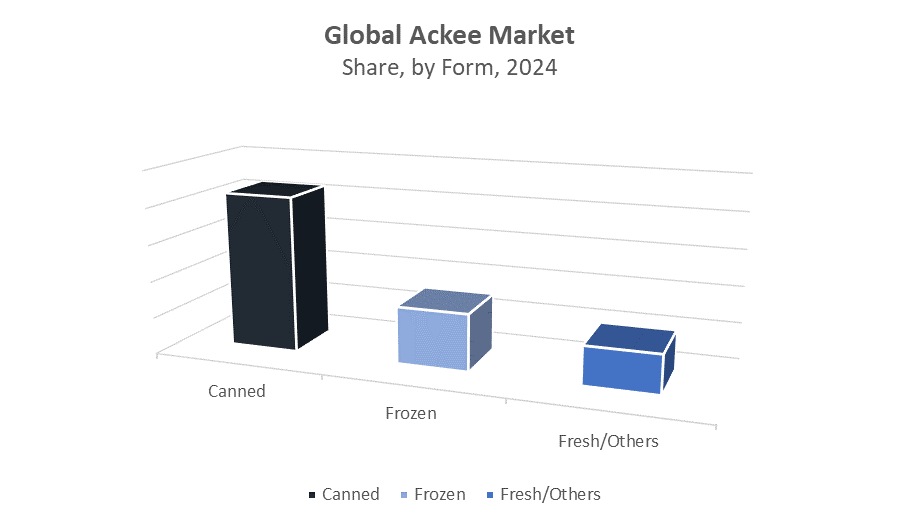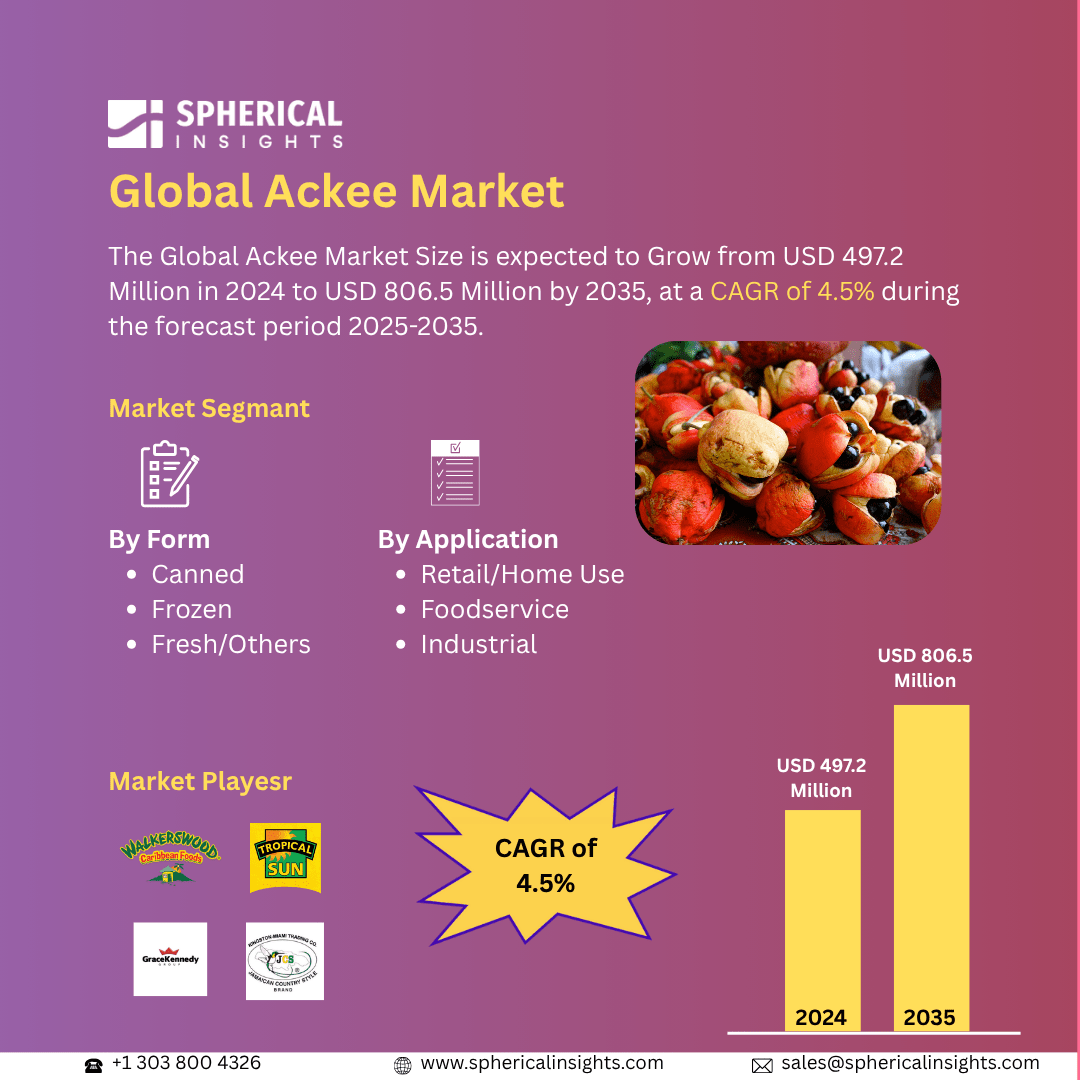Ackee Market Summary, Size & Emerging Trends
According to Spherical Insights, The Global Ackee Market Size is expected to Grow from USD 497.2 Million in 2024 to USD 806.5 Million by 2035, at a CAGR of 4.5% during the forecast period 2025-2035. The growing demand for exotic tropical fruits, rising consumer interest in Caribbean cuisine, and the expanding use of ackee in processed food applications are key factors driving market growth.
Key Market Insights
- North America is expected to account for the largest share in the global ackee market during the forecast period.
- In terms of form, the canned segment dominated global revenue in 2024 and is projected to maintain its lead through 2035.
- In terms of application, the foodservice segment accounted for the largest revenue share during the forecast period, supported by the growing number of Caribbean restaurants globally.
Global Market Forecast and Revenue Outlook
- 2024 Market Size: USD 497.2 Million
- 2035 Projected Market Size: USD 806.5 Million
- CAGR (2025-2035): 4.5%
- North America: Largest market in 2024
- Europe: Fastest growing market

Ackee Market
The global ackee market revolves around the production, processing, and distribution of Blighia sapida, a tropical fruit native to West Africa and widely cultivated in Jamaica and the Caribbean. Ackee is a national fruit of Jamaica and a central ingredient in the iconic dish “Ackee and Saltfish.” The market includes both fresh and processed (canned and frozen) forms, with increasing consumption across export markets such as the United States, Canada, and the United Kingdom. Technological improvements in packaging and freezing have enhanced product safety and shelf life, driving greater acceptance in international markets. Rising consumer awareness of the fruit’s nutritional benefits, rich in fatty acids, vitamin A, zinc, and protein, is promoting global market penetration.
Ackee Market Trends
- Growing demand for Caribbean and tropical cuisines in international markets.
- Rising exports from Jamaica and the Caribbean due to government-supported agricultural trade programs.
- Increased product innovation in canned and frozen ackee, enhancing convenience and safety.
- Sustainability and traceability initiatives gaining traction among exporters and distributors.
Ackee Market Dynamics
Driving Factors: Expanding Global Demand for Exotic Tropical Fruits
The global ackee market is experiencing notable growth driven by the expanding consumer appetite for exotic and authentic tropical fruits. With globalization and cultural exchange shaping modern dietary preferences, ackee has emerged as a symbol of Caribbean cuisine and heritage. The increasing popularity of Caribbean food culture, particularly in North America and Europe, has significantly boosted demand for traditional ingredients like ackee, both in restaurants and retail channels. Migration from the Caribbean to developed regions has further strengthened the market base, introducing ackee to new demographics eager to explore ethnic and tropical flavors. Technological advancements in preservation and packaging have also played a critical role in market expansion. The adoption of vacuum-sealed packaging and rapid freezing techniques ensures product stability and freshness, allowing ackee to be distributed year-round without compromising quality. These innovations have transformed what was once a highly seasonal and regional fruit into an internationally traded commodity.
Restrain Factors: Regulatory Constraints and Perishability
Despite its strong growth potential, the ackee market faces several challenges, primarily related to food safety and perishability. The fruit naturally contains hypoglycin A, a toxin that can be harmful if consumed when the fruit is unripe or improperly processed. As a result, the U.S. Food and Drug Administration (FDA) and the European Food Safety Authority (EFSA) enforce stringent import regulations to ensure consumer safety. These regulations, while necessary, increase the compliance burden for producers and exporters, adding to processing and testing costs.
Opportunities: Technological Advancements and Expanding Distribution Networks
Despite existing restraints, the ackee market offers significant opportunities for growth, particularly through technological innovation and global distribution expansion. Recent advancements in canning and freezing technologies have enhanced product quality, safety, and longevity, enabling exporters to tap into distant markets without compromising freshness. These innovations have helped transform ackee from a niche regional product into a mainstream tropical fruit offering with strong export potential. Moreover, the rise of e-commerce platforms and speciality food retail channels is providing new avenues for Caribbean producers to reach global consumers. Online retail allows for direct-to-consumer distribution, bypassing traditional trade barriers and expanding visibility in emerging markets.
Challenges: Supply Chain and Weather-Related Risks
The ackee industry faces ongoing challenges linked to environmental and logistical factors. As an agricultural product, ackee cultivation is highly dependent on favorable weather conditions, making it vulnerable to climate-related risks such as droughts, hurricanes, and irregular rainfall patterns. These environmental disruptions can significantly impact yield quality and availability, creating fluctuations in global supply and pricing.
Global Ackee Market Ecosystem Analysis
The global ackee market ecosystem comprises farmers, exporters, processing companies, and end-users in retail, foodservice, and industrial applications. Key players focus on ensuring compliance with food safety standards such as HACCP and FDA approvals for canned ackee exports. Governments and trade organizations in the Caribbean are also promoting sustainable cultivation and certification programs to maintain export standards. The market’s growth is influenced by supply chain efficiency, product innovation, and trade partnerships with importers in major markets like the U.S., Canada, and the UK.
Global Ackee Market, By Form
The canned ackee segment dominated the global market in 2024, accounting for an estimated 60% of total revenue. This strong market position is attributed to the widespread consumer preference for long-shelf-life and ready-to-use tropical food products, particularly in international export markets. Canned ackee offers the dual advantage of extended preservation and compliance with international food safety standards, making it the most commercially viable form for large-scale distribution. The segment’s leadership is further reinforced by its popularity among Caribbean restaurants, retail chains, and diaspora consumers in North America and Europe, where regulatory compliance and consistent product quality are key purchasing criteria. The canning process effectively neutralizes the natural toxin hypoglycin A, ensuring safe consumption and facilitating easier import approvals under FDA and EU food safety frameworks.

The frozen ackee segment is emerging as a high-potential category, projected to register a CAGR of 6.5% from 2025 to 2035. This segment’s expansion is primarily driven by the rising consumer shift toward natural, preservative-free products that retain authentic flavor and texture. Unlike canned variants, frozen ackee appeals strongly to health-conscious consumers and premium foodservice operators who prioritize freshness and nutrient retention. Freezing technology allows producers to maintain the fruit’s original taste, color, and nutritional profile, while significantly extending its storage life. This makes frozen ackee an ideal choice for foodservice applications such as hotels, catering services, and high-end restaurants seeking high-quality tropical ingredients. The segment is also gaining traction among industrial buyers, including frozen meal manufacturers and ethnic food processors.
Global Ackee Market, By Application
The foodservice segment led the global ackee market in 2024, accounting for approximately 45% of total revenue. This dominance is primarily driven by strong demand from restaurants, hotels, and catering services that specialize in Caribbean cuisine. The segment benefits from the increasing popularity of authentic tropical dishes in international markets, where consumers seek unique culinary experiences. Rising tourism in the Caribbean and Caribbean-themed festivals abroad further amplify consumption of ackee in the foodservice sector. Restaurants and hotels prefer canned and frozen ackee due to their convenience, consistent quality, and compliance with food safety standards, allowing chefs to focus on menu innovation without concerns over spoilage or toxin management.
The retail or home use segment represents a significant portion of global ackee demand, driven by the increasing availability of canned and frozen ackee through supermarkets, grocery chains, and online platforms. This segment caters primarily to diaspora consumers and tropical food enthusiasts seeking convenient, ready-to-cook ackee products for home preparation. The growth in this segment is fueled by the expansion of e-commerce channels, which allow Caribbean producers to reach consumers in distant markets, including North America, Europe, and Asia. Consumers value the long shelf life and safe consumption of canned ackee, as well as the fresh-like taste and nutrient retention of frozen ackee.
North America accounted for over 40% of the global ackee market revenue in 2024, making it the largest regional market. The strong presence of the Caribbean diaspora in the United States and Canada is a key driver of consistent import demand, as these consumers seek authentic tropical fruits for traditional recipes. The region’s growing interest in tropical and ethnic cuisines further boosts consumption, particularly in metropolitan areas with diverse culinary offerings. Canned and frozen ackee are preferred due to their long shelf life, food safety compliance, and ease of distribution, enabling supermarkets, specialty stores, and foodservice operators to maintain a reliable supply. Additionally, collaborations between Caribbean exporters and North American distributors ensure year-round availability, solidifying the region’s dominant market position.
Europe is emerging as the fastest-growing region for ackee, projected to achieve a CAGR of 6.7%. The United Kingdom serves as the primary import hub, followed by France and Germany, where increasing consumer interest in ethnic and Caribbean foods is driving demand. The expansion of supermarkets, specialty grocery stores, and online retail platforms has made ackee more accessible to European consumers. Rising cultural awareness through Caribbean restaurants, culinary festivals, and media exposure is also promoting trial and adoption. With regulatory frameworks in place for imported canned and frozen ackee, European markets are becoming a key growth region, offering significant opportunities for exporters aiming to tap into the continent’s rising appetite for tropical fruits.
WORLDWIDE TOP KEY PLAYERS IN THE ACKEE MARKET INCLUDE
- Linstead Market Jamaica
- Walkerswood Caribbean Foods Ltd.
- Tropical Sun Foods
- GraceKennedy Group
- Jamaican Country Style Brand
- National Rums of Jamaica (Food Division)
- Carita Jamaica Ltd.
- Geddes Refrigeration Ltd.
- Island Pride Foods Ltd.
- Others
Product Launches in Ackee Market
- In June 2024, the GraceKennedy Group expanded its canned ackee production facility in St. Catherine, Jamaica, responding to the growing export demand in North America and Europe. This expansion enhances the company’s production capacity and ensures a reliable supply of high-quality canned ackee to meet the needs of retailers, foodservice operators, and ethnic cuisine distributors. By scaling operations, GraceKennedy is positioned to strengthen its market presence in key international markets while maintaining compliance with global food safety standards.
- In March 2023, Linstead Market launched a new line of organic frozen ackee, targeting health-conscious consumers in the U.S. and U.K. markets. This product launch leverages advanced freezing technologies to preserve the fruit’s flavor, texture, and nutritional value, catering to the rising demand for preservative-free and premium-quality tropical fruits. The initiative highlights a trend toward organic and specialty food products, enabling Caribbean producers to capture niche segments in competitive international markets.
Market Segment
This study forecasts revenue at global, regional, and country levels from 2020 to 2035. Decision Advisor has segmented the ackee market based on the below-mentioned segments:
Global Ackee Market, By Form
- Canned
- Frozen
- Fresh/Others
Global Ackee Market, By Application
- Retail/Home Use
- Foodservice
- Industrial
Global Ackee Market, By Regional Analysis
- North America
- Europe
- Germany
- UK
- France
- Italy
- Spain
- Russia
- Rest of Europe
- Asia Pacific
- China
- Japan
- India
- South Korea
- Australia
- Rest of Asia Pacific
- South America
- Brazil
- Argentina
- Rest of South America
- Middle East & Africa
- UAE
- Saudi Arabia
- Qatar
- South Africa
- Rest of the Middle East & Africa





